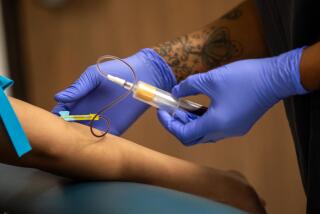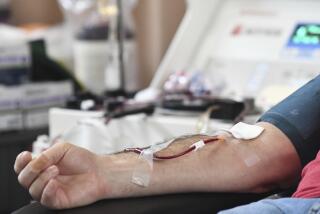U.S. Backs Routine HIV Testing at Hospitals : Health: The proposal is geared toward areas with significant numbers of AIDS cases. Guidelines call for voluntary screening, followed by counseling.
- Share via
WASHINGTON — The federal government recommended Thursday that hospitals in regions with significant numbers of AIDS cases routinely offer HIV testing to the majority of their patients--meaning that HIV screening could become a part of every patient’s regular blood work-up.
The proposal from the U.S. Public Health Service, which almost certainly will prove controversial, signals a further policy shift toward the increased testing of mainstream populations and away from a longtime focus on testing only those considered to be at high risk of infection.
The guidelines emphasize that such testing be strictly voluntary and accompanied by informed consent and counseling. The recommendation also stresses that test results should be confidential and that people who refuse to be tested should still receive full medical care.
“These recommendations will help people learn of their HIV status and get early treatment to delay the disease and prolong their lives,” Health and Human Services Secretary Donna Shalala said in a statement. “Knowing their status, they will also be able to take precautions to protect loved ones.”
The proposal, first drafted and circulated in September, 1991, by the Atlanta-based Centers for Disease Control and Prevention, marks the first time that the federal government has sought formally to encourage the testing of hospital patients who are not necessarily considered at risk for AIDS infection. A similar suggestion debated by public health officials in 1987 was subsequently abandoned, along with a proposal to test all applicants for marriage licenses.
But the CDC said that the latest recommendation was based on new data obtained through anonymous testing of hospital patients’ blood that indicated many unrecognized HIV infections would be detected by such hospital-based testing.
If adopted, the recommendations likely would have a major impact on the practices of public and private hospitals and on state and local health departments across the country. Particularly affected would be inner-city hospitals and states with large numbers of AIDS cases, among them, New York, California, New Jersey and Florida.
The recommendations are not binding but are expected to wield considerable influence in the public health community, which typically looks to the Public Health Service for policy guidance.
The new policy recommendations call for hospitals to “strongly consider” offering HIV counseling and testing routinely to patients between the ages of 15 and 54 if the AIDS prevalence rate in the area is greater than 1%, or if one in 1,000 discharged patients has AIDS. Patients in this age range at these hospitals account for about 68% of HIV-infected people hospitalized in the United States for conditions other than those that are AIDS-related, the health service said.
The policy would apply both to patients who are admitted and to those treated on an outpatient basis.
The recommendation was applauded by the medical profession but criticized by AIDS groups who predicted that it would be nearly impossible to provide the appropriate levels of counseling and services to those who test positive.
“Public hospitals are already strapped--overworked and understaffed,” said Dan Bross, executive director of AIDS Action Council, a Washington-based lobbying group. “The areas this will apply to are the very ones least equipped to handle it. What good will testing do if they can’t provide counseling or services to those who are infected?”
Dr. David Rogers, vice chairman of the National Commission on AIDS, agreed.
“I think, at first blush, it sounds reasonable, particularly if the hospitals are geared up and meticulous about confidentiality--because so much misery has occurred when that hasn’t happened,” he said. “But it’s potentially cruel if you are simply testing, then offering no real support or services. I personally feel that you should know your status--because there are things you can do. But testing in the absence of that could be troublesome.”
The American Medical Assn., however, said that it supports the move, saying that it has long advocated hospital testing of patients.
“Early identification of those infected offers opportunities to initiate life-prolonging and life-enhancing treatment, as well as prevent the spread of infection to others,” said Dr. M. Roy Schwarz, senior vice president of the AMA and chairman of its AIDS task force.
Furthermore, he said, the practice will offer an extra layer of protection for health care workers concerned about transmission in the hospital setting.
More to Read
Sign up for Essential California
The most important California stories and recommendations in your inbox every morning.
You may occasionally receive promotional content from the Los Angeles Times.













